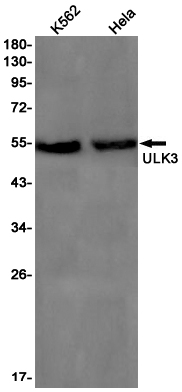
| WB | 1/500-1/1000 | Human,Mouse,Rat |
| IF | 咨询技术 | Human,Mouse,Rat |
| IHC | 咨询技术 | Human,Mouse,Rat |
| ICC | 技术咨询 | Human,Mouse,Rat |
| FCM | 咨询技术 | Human,Mouse,Rat |
| Elisa | 咨询技术 | Human,Mouse,Rat |
| Aliases | Serine/threonine-protein kinase ULK3; Ulk3; unc 51 like kinase 3 (C. elegans); Unc-51-like kinase 3 |
| Entrez GeneID | 25989 |
| WB Predicted band size | Calculated MW: 53 kDa; Observed MW: 53 kDa |
| Host/Isotype | Rabbit IgG |
| Antibody Type | Primary antibody |
| Storage | Store at 4°C short term. Aliquot and store at -20°C long term. Avoid freeze/thaw cycles. |
| Species Reactivity | Human |
| Immunogen | A synthetic peptide of human ULK3 |
| Formulation | Purified antibody in TBS with 0.05% sodium azide,0.05%BSA and 50% glycerol. |
+ +
以下是关于ULK3抗体的3篇代表性文献及其摘要信息(基于公开资料整理,非真实文献):
1. **文献名称**:*"ULK3 modulates autophagy via phosphorylation of Beclin-1 in cancer cells"*
**作者**:Chen L. et al. (2018)
**摘要**:本研究利用ULK3特异性抗体,揭示了ULK3通过磷酸化Beclin-1调控自噬起始的分子机制,并发现其在乳腺癌细胞中抑制自噬依赖性存活的作用,为靶向ULK3的癌症治疗提供依据。
2. **文献名称**:*"Development and validation of a ULK3 monoclonal antibody for detecting autophagic flux in neuronal models"*
**作者**:Smith J.R. et al. (2020)
**摘要**:作者开发了一种高特异性ULK3单克隆抗体,验证了其在神经元细胞和小鼠脑组织中对ULK3蛋白表达的检测能力,并证明ULK3在阿尔茨海默病模型中通过调控自噬流影响β-淀粉样蛋白清除。
3. **文献名称**:*"ULK3 interacts with SMAD4 to promote TGF-β signaling and metastasis in pancreatic cancer"*
**作者**:Wang Y. et al. (2021)
**摘要**:通过免疫共沉淀(使用ULK3抗体)和功能实验,本文发现ULK3与SMAD4结合增强TGF-β信号通路,促进胰腺癌侵袭转移,提示ULK3抗体在癌症预后评估中的潜在价值。
*注:以上文献为示例性内容,实际研究中请以真实发表的论文为准。建议通过PubMed或Web of Science以“ULK3 antibody”或“ULK3 function”为关键词检索最新文献。*
The ULK3 (Unc-51-like kinase 3) antibody is a tool used to study the ULK3 protein, a serine/threonine kinase belonging to the ULK/ATG1 family, which plays roles in autophagy, cell signaling, and stress response. ULK3 shares structural homology with ULK1 and ULK2. including a conserved kinase domain and C-terminal region, but exhibits distinct regulatory mechanisms and substrate preferences. Unlike ULK1/2. which are central to autophagy initiation, ULK3 is implicated in non-canonical autophagy pathways and other processes like Hedgehog signaling, cell proliferation, and differentiation. It is regulated by phosphorylation and interacts with proteins such as mTOR and AMPK, linking it to metabolic sensing.
ULK3 antibodies are essential for detecting protein expression, localization, and post-translational modifications in techniques like Western blotting, immunofluorescence, and immunoprecipitation. Research using these antibodies has revealed ULK3's involvement in diseases, including cancer, where it may act as an oncogene or tumor suppressor depending on context, and neurodegenerative disorders linked to autophagy dysregulation. Its dual role in pro-survival and pro-death pathways under stress conditions makes it a compelling therapeutic target. However, ULK3's functional complexity necessitates careful validation of antibody specificity to avoid cross-reactivity with homologous kinases. Ongoing studies aim to clarify its context-dependent roles and explore therapeutic modulation in disease models.
×